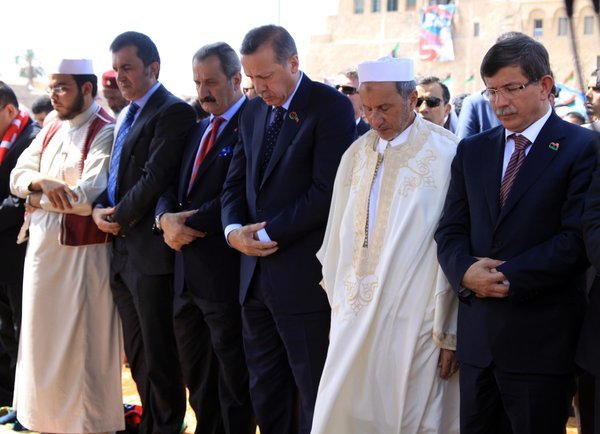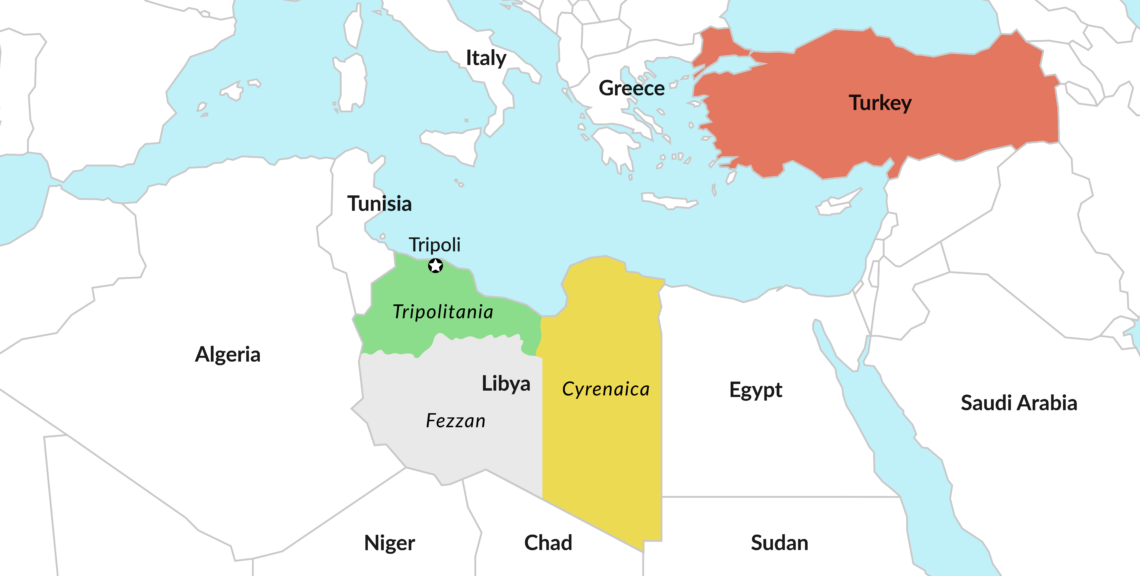Turkey’s moves on the Libyan chessboard
Turkey provides assistance to the Libyan Government of National Accord in its war against the Libyan National Army. More than religious sentiment, it is Prime Minister Erdogan’s wish to see Turkey become a key player in the region that drives this involvement.

In a nutshell
- Turkey is one of the staunchest supporters of the UN-backed Libyan government in its war against Field Marshal Haftar
- Turkish involvement is motivated by economic factors, especially access to the Mediterranean Basin
- If the Libyan National Army retaliates against Turkish nationals in Libya, the conflict will escalate
On April 4, 2019, after months of movements in the Fezzan region, Field Marshal Khalifa Haftar and his cluster of militias – namely the Libyan National Army (LNA) – openly attacked the UN-backed Government of National Accord (GNA) in Tripoli. This strategically questionable move inflamed Libyans’ emotions and further polarized the situation, especially at the regional level. The war was no longer relegated to the Libyan borders; it had become broader and more dangerous.
Since the start of the second Libyan civil war in 2014, and to some extent even earlier, players have been rallying either behind GNA Prime Minister Fayez al-Sarraj or Field Marshal Haftar. Supranational entities like the United Nations and, most importantly, Italy, Turkey and Qatar all support the former. However, France, Egypt, the United Arab Emirates, Russia and Saudi Arabia are siding with the latter.
Dangerous game
Each of these actors has chosen a side for strategic reasons. Italy, for example, has stayed faithful to the GNA out of economic interest, since most of the oil wells managed by the Italian oil and gas company Eni are located in Tripolitania. These interests tie in with the role Italy hopes to play in the Mediterranean Basin, which is rooted in historical involvement dating back to the colonial era.
Meanwhile, Egypt, which favors Field Marshal Haftar, has been trying to influence the political dynamics of neighboring Cyrenaica (an eastern coastal region of Libya) for centuries, foremost for economic reasons. A country of 100 million inhabitants, most of Egypt’s territory is desert, with no particular energy resources, unlike Libya. For decades, Egyptian workers have moved across the border to work in Libyan facilities. The last eight years of the Libyan crisis have forced many workers to return to Egypt, where they are unable to find employment. For Egyptian President Abdel-Fattah El-Sisi, this is an issue that must be resolved as soon as possible. Moreover, Field Marshal Haftar embodies the military strongman model, a paradigm appreciated by Egyptian generals – and dictators around the world.
Each actor chose a side for strategic reasons.
The stance of Middle Eastern states like the United Arab Emirates and Saudi Arabia is determined by their struggle against the Muslim Brotherhood. In the 2012 democratic elections in Libya, the Justice and Construction Party, which is associated with the Muslim Brotherhood, won 17 of the 80 party-list seats. This was an insurmountable issue for countries that perceive the Islamist organization as a threat to their status quo.
Long ties
In this multiparty game, Turkey immediately took on an important role for several reasons.
For centuries, the ancient Ottoman Empire ruled Libya with a long leash, but still managed to maintain extremely useful strategic bases on the central Mediterranean Sea – the very same bases that Russia now covets. In 1912, Italy easily wrested them from the empire with a fast and painless war. However, Libyan ties with the Bosporus have not died out, especially from an economic standpoint. This economic relationship is more relevant to the current situation than any religious solidarity.
Turkish-Libyan relations officially began in 1974, when the U.S. proclaimed an embargo in response to the Turkish seizure of northern Cyprus. At the time, Libyan leader Muammar Gaddafi (1969-2011) was eager to grasp any opportunity to antagonize the United States. Turkish businessmen began investing in Libya, building hotels, shopping malls and hospitals.
During the 2011 revolution, Turkey had to evacuate 25,000 workers at huge cost. Turkish President Recep Tayyip Erdogan is now trying to offset these losses with several contracts with Libya amounting to approximately $15-18 billion. Furthermore, Turkey competes with Cyprus for control of potential offshore energy finds, which would allow it to become the main natural gas channel to Europe from the eastern Mediterranean. Libya could be the keystone of this ambitious project.
Facts & figures
Libya, Turkey and the Mediterranean Basin

The Conference for Libya organized in Palermo last November proved to be a litmus test of this interest. The vice president and head of the Turkish delegation at the Sicilian summit, Fuat Oktay, walked out of the conference, citing “deep disappointment” for having been excluded from an informal meeting between Mr. Fayez al-Sarraj and other leaders. When asked to explain his departure, he answered that “we cannot think of resolving the crisis in Libya by involving the people who caused it and excluding Turkey” – an obvious indicator of Turkey’s plans for Libya.
Moreover, the Libyan Justice and Construction Party presents many similarities to Mr. Erdogan’s Justice and Development Party, and both are close to the Muslim Brotherhood. The Turkish embassy in Tripoli and the Turkish consulate in Misrata were among the last diplomatic institutions to close during the 2014 civil war, underlining the strong ties between the two nations.
Turkey plays
In May 2019, a Turkish shipment of BMC-Kirpi vehicles and weapons was taken over by international observers in Tripoli. (Mine-resistant BMC-Kirpi vehicles offer superior protection to soldiers compared to normal armored high-mobility multipurpose wheeled vehicles.)
Turkey’s actions in the war unleashed by Field Marshal Haftar not only indicate a wish to protect economic interests, but mainly a bid to become the dominant player in the regional competition, which has been exacerbated by the conflict of these past months. Material help to Mr. al-Sarraj’s government shows Ankara would like to be rid of the inconvenient Field Marshal Haftar as soon as possible. Should the GNA be removed by the Libyan National Army, Turkey would find itself boxed into a small area of the eastern Mediterranean, with Cyprus and Greece able to expand their maritime interests. Greece, for example, claimed rights over a naval zone of almost 40,000 square kilometers after the end of the Gaddafi regime to gain influence in Mediterranean waters.
Turkey is likely to increase its material, financial and strategic support to the GNA and the coalition of GNA-aligned militias in the short- or medium-term so as to protect its broader strategic interests in the region. It is therefore unsurprising that Field Marshal Haftar has attempted to fight back in recent weeks. He banned commercial flights between Cyrenaica and Turkey, prohibited Turkish ships from approaching eastern ports and arrested six Turkish citizens (allegedly working for a Libya-based oil company), freeing them only after threats of violence from Ankara.
Turkish animosity toward Field Marshal Haftar has become obvious.
The recent GNA recapture of the strategic city of Gharian, south of Tripoli, has a distinctly Turkish flavor, given that troops had Turkish vehicles and drones – despite the explicit UN resolution for an arms embargo in Libya. Turkey has also welcomed a group of exiled Libyans on its territory, allowing them to move weapons back to their homeland.
During the last few months, Turkish animosity toward Field Marshal Haftar has become obvious, as shown by an attack on May 16. A group of Bayraktar armed drones were launched from a Misrata outpost against the Jufra air base, a strategic military base of the LNA. Drone warfare, in this low-intensity conflict, is a tactic that should be carefully monitored. Such drones have already played a crucial role in the fight for Tripoli, and there are rumors of Turkish military being deployed to Libya especially to operate them and to train Libyans. This is probably only the beginning, although the Turkish special envoy to Libya, Emrullah Isler, has strongly denied any delivery to the Tripoli shores. His statement is difficult to believe. In fact, on July 5 Prime Minister al-Sarraj visited Prime Minister Erdogan in Istanbul, in all likelihood to ensure that cooperation with Turkey can continue and perhaps even intensify.
Incidentally, one day earlier, another eight Bayraktar TB-2 drones arrived in Tripoli, while an Ilyushin II-76 strategic airlifter – designed to transport heavy machinery – flew for four continuous days between Ankara and Tripoli. It is impossible to say with certainty what it carried, but it is easy to imagine.
Scenarios
1) Thanks to international diplomacy, the two Libyan fronts decide to agree on terms and sign a truce supported by regional actors, including Turkey.
At the moment this is the most improbable hypothesis. Field Marshal Haftar has consistently accused Prime Minister al-Sarraj of being too indecisive to govern, asserting that Libyans – in his opinion – are not ready for democracy yet. Meanwhile, Mr. al-Sarraj has recently stated he was ready to do everything to give Libya a democratic future, but that there could be no place for Field Marshal Haftar at the negotiating table. In practical terms, this means peace is impossible in Libya as long as the two remain in position.
2) The war continues at the current level of intensity; neither of the two Libyan protagonists step down. The situation remains more or less the same.
This is the most probable scenario. A low-intensity, protracted conflict that aims to exhaust the other side. Regional actors will provide war supplies, money and advisors while keeping enough distance to avoid losing face with the international community.
3) A regional actor intervenes in support of one faction to end the conflict as rapidly as possible.
This scenario is possible, but unlikely. The most involved regional actor is Turkey, which sees Libya as a fundamental strategic chessboard within the Mediterranean Basin. Because of its extraordinary energy resources and market potential, Libya is worth a fight, economically speaking. Turkey could enter the fray more substantially if Field Marshal Haftar or one of his international sponsors were to retaliate against Turkish citizens on Libyan soil – much like the recent incident in which Turkish citizens were detained. There is nothing to prevent such skirmishes from taking place again.








